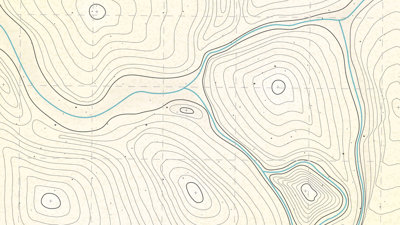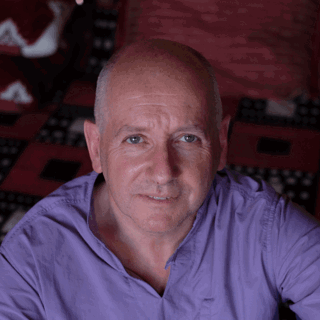How did you get to where you are now?
Born and raised in rural Shropshire ensured I was well grounded and aware of the benefits of learning outdoors; a rural childhood also made me reasonably independent, and as content in my own company as with others. The main turning point in my life was a six-week expedition to Arctic Norway with British Exploring Society, an experience that opened many doors, and led to a decade of Arctic exploration, leading expeditions across the Greenland Ice Cap, into the North West Passage, and to Svalbard, where we spent an entire year living in the wild, including four months of total darkness.
A few part time jobs after a degree in Environmental Science saw me ultimately enter teaching, via a PGCE in geography at Aberystwyth University. Teaching enabled me to continue expeditions, and travel. After a few years teaching in Kenya, where I reconnected with Outward Bound, who had a base at the foot of Kilimanjaro, I ended up in the Middle East, where I’ve been for more than 20 years now, falling in love with the culture, the landscape and the sunshine.
Was there anything particularly useful that helped you get into this role?
Volunteering (in Scotland and Kenya) for Outward Bound prior to getting full time employment worked well because it gave me an insight into the organisational culture, and gave the organisation the opportunity to get to know me. Outward Bound is all about education and learning, so the years working with young people in the classroom enabled me to understand the fundamentals of education, and the limitations of only educating within four walls. Leading expeditions, chasing commercial sponsorship and managing expedition budgets and communications added commercial skills to the mix.
What do you do as part of your role?
Outward Bound in Oman (OBO) is a relatively young organisation, founded in 2009. As such, everyone multitasks, including me. My job is to give the organisation strategic direction, to inspire the staff to ensure we remain focused on our mission, and that the quality of what we do remains as high as possible. As a not-for-profit, financial control and transparent governance are as essential as demonstrating and ensuring relevance to our multiple donors and supporters.
A typical week for me is spent at the OBO office in Muscat, working with the staff, writing pitches for funding and meeting key stakeholders. Whenever I can I try to get out into the field to see the team at work; that involves a two hour drive either to the desert, or up to 8000ft into the Jebel Akdhar mountains, where we use the shade of 1,000 year old juniper trees as our classroom in the hotter months, when it can reach 48 degrees.
What skills and characteristics do you need for this role, apart from geographical knowledge?
Passion, and a good understanding of education, and the surrounding business climate and culture is key. Doing business in the Middle East is different to the UK; trust takes longer to earn, and it may take several meetings before detailed discussions begin. There are multiple requests for any potential donors to consider, and many worthy causes to support; I have to be able to convince them of the value of learning outdoors, which, backed up by 40 years of experience, is relatively easy because I know the impact that it has through my own experience. Establishing an outdoor learning organisation is no different to setting up any SME; a firm belief in what you are doing, tight financial control, leading by example and enabling others to realise their potential are all key factors.
How does geography feature in your work/what difference does it make?
An awareness of the geopolitical situation in the region is important when formulating strategy, and keeping one eye on the economy, which in Oman is heavily dependent on oil, enables me to shape pitches for support from both government and the private sector. Geography for me is the one subject that pulls together all the various strands of life-history, economics, science and so on, so that ability to reflect on multiple sources of information and come to a balanced way forward is extremely helpful when running a small business.
What are the opportunities for career progression? Where might you be in five years’ time?
Progression does not necessarily mean shifting jobs; I have no wish to do anything else, but my desire is to play my part in progressing Outward Bound Oman as an organisation. In five years the aim is to have constructed three fully funded, purpose built centres for outdoor learning, and hand over to my successor via a smooth transition that ensures a sustainable future.
What advice would you give to someone wanting to go in to this career?
Go into it for the right reasons. Outward Bound has been so successful over the decades that the term has become synonymous with outdoor learning and adventure, but OB is much more about learning, than multiactivity. It’s about creatively challenging people to safely step out of their normal lives and comfort zones to achieve more than they thought they could … or in some cases, to give them a sense of perspective that others may be better than you! If what you love is climbing extreme rock routes, or kayaking grade four rapids, this isn’t the work for you - people come first.
How do you maintain your knowledge and interest in geography outside of work?
Being immersed in the Arab culture ensures my interest in geography remains undimmed. I always look forward to Geographical magazine arriving in the post each month, and being a Fellow of the RGS-IBG also enables me to go online and listen to the great Monday night lectures, despite being 8,000 miles away.
Why did you choose geography? Why should others choose geography?
I chose geography because for me it was just so relevant to understanding life, and the world around me, the one subject that stitched all the others together and led to a coordinated understanding and solution. If I were King (or Sultan) for a day, I would remove all other subjects from the school curriculum, and deliver them through geography to ensure young people understand the interconnectivity of our world, and that things don’t happen in isolation.
Jobs in this role/sector can attract salaries in the range £48,000 - £63,999.
* This interview was undertaken in 2019 and was correct at the time of publication. Please note that the featured individual may no longer be in role, but the profile has been kept for career pathway and informational purposes.

